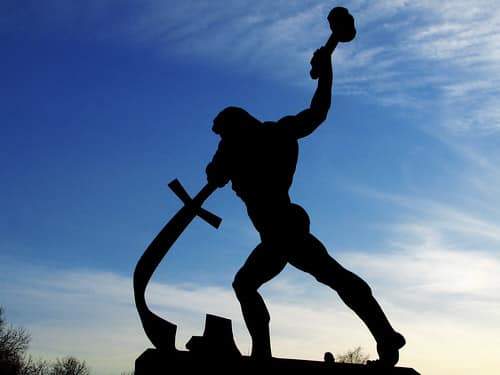WHEN HEALTH WORKERS BECOME PATIENTS
May 3, 2020CRISIS OF FAITH
May 5, 2020
Homily for Monday of the Fourth Week of Easter, 04 May 2020, John 10:11-18
I am sure most young Filipinos today are aware that there are presently two Koreas—North and South. But I wonder if they also know that there used to be two Germanies since 1961: East and West. This was the era of the Cold War between east and west. East Germany called itself the German Democratic Republic, while West Germany was known as The Federal Republic of Germany. They were reunited only in 1989.
I can never forget this historical trivia because I stayed for two months in West Berlin, just a few months before the wall dividing East and West Germany collapsed in 1989 and Germany finally became one again. I lived in a parish very close to the Berlin wall, while I was learning some German. I remember having long conversations with the sacristan of that parish who longed to see his family in the opposite side of the wall, in East Berlin, whom he had not seen since Germany got divided by that wall. The idea of reunifying Germany was still basically a dream; nobody thought it could come true before the end of the 20th century.
I wouldn’t be surprised if many Koreans are presently also dreaming of the same thing—a reunified Korea. On my last visit to South Korea, two years ago, I learned that the archbishop of the archdiocese of Seoul is ready to send one half of his priests to Pyongyang in North Korea, in the event that the two Koreas are reunited and religious freedom is restored.
Today’s readings are about the elusive dream of unity and peace in the world. In the Gospel, Jesus says something very prophetic. He says, “The time is coming when there shall be one flock, because there is one Shepherd.” And in the first reading, St. Luke tells us in Acts 11 about the beginning of the collapse of the dividing wall between the Jews and the Gentiles within Early Christianity.
We are still busy with this elusive dream two thousand years later. In 1985, in response to the call to unity and solidarity to feed the hungry children in Africa, American artists and musicians led by Michael Jackson, produced one of the biggest fundraising events ever organized in history. It’s theme song became very popular, and I noticed that it was revived again in the social media when the lockdown started: WE ARE THE WORLD. Its first line said, “There comes a time when we hear a certain call and the world must come together as one. There are people dying, Oh it’s time to lend a hand to life the greatest gift of all.”
There really is a point when the things that divide us, or the things that put countries in conflict with one another become secondary, if not irrelevant. It looks like the pandemic crisis has become that very point in time.
I find it significant that most countries around the world have agreed to call the Covid crisis a world war, and it’s not about countries having to fight with each other, but the whole world having to fight a common enemy— a virus. I heard Governor Cuomo of NY on TV making the impassioned plea to think WE instead of ME.
This morning, while reading today’s edition of the Philippine Inquirer, a letter to the editor expressing the same thing caught my attention. The letter said, “Armed hostilities lose meaning amid pandemic.” It called attention to both government and the CPP-NPA to put an end to what is now known as the longest running armed conflict in the world. The letter also quoted a message communicated by the UN Sec Gen. Antonio Gutierres, “It is time to put armed conflict on lockdown and focus together on the true fight of our lives.”
Even Pope Francis has added his voice to this call in his Urbi et Orbi Easter message. Appealing for global solidarity in the common battle against Covid19, he called on warring nations to enact an immediate ceasefire on all conflict fronts.
Believe it or not, the coming fulfillment of this dream has been prophesied by the prophet Isaiah who lived around the 8th century before Christ. In his oracle in Isaiah Chapter 2, the prophet dreamed of a time when all the nations on earth would find themselves climbing the mountain of the Lord together in order to be instructed in the ways of God. At that time he says, nations “shall beat their swords into plowshares and their spears into pruning hooks”. Meaning, the weapons of war will be transformed into tools for production. Instead of killing each other, he said, we will learn to feed each other. The same dream is announced in Isaiah chapter 11: “At that time,” he said, “the wolf shall be a guest of the lamb, and the leopard shall lie down with the young goat; The calf and the young lion shall eat grass together, with a little child to guide them. No one shall ever again hurt or destroy on God’s holy mountain.”
How do we work for the realization of this dream when there is always that strong tendency for us to relate only with the people who think and behave as we do? Even among us Christians there is so much conflict and division. How do we deal with people who think and act differently from us?
There is a Latin saying that seems to offer a practical answer to this question. The saying is often attributed to St. Agustine, but historians say it was actually said by a 17th century archbishop named Marco Antonio de Dominis, “In necessariis unitas, in dubiis libertas, et in omnibus caritas.”
In English perhaps I can paraphrase it this way, “Around the essential things in life, let us aspire for unity. Over the things we feel uncertain about, let us respect each other’s liberty. But in all things, let us deal with each other in Charity.”











